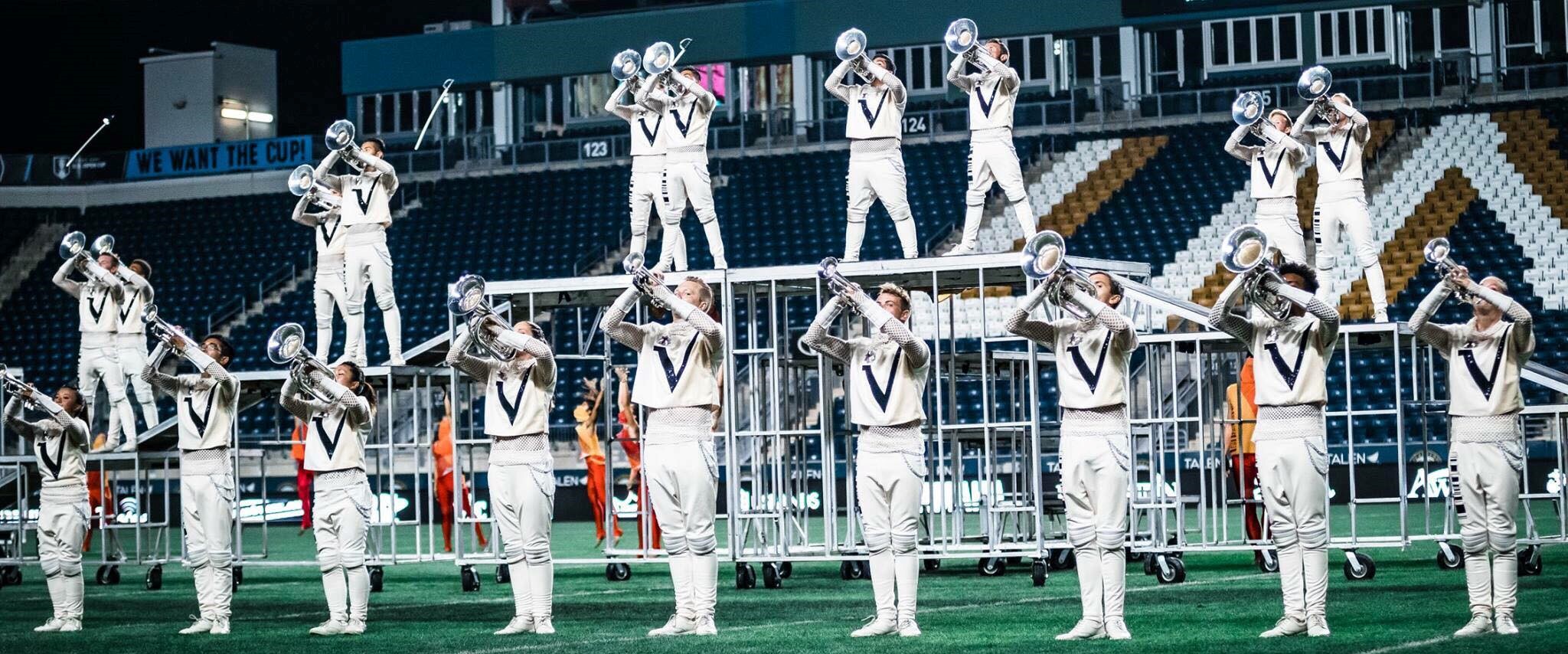Babylon
Drum corps
If you’ve never heard of drum corps, it’s basically marching band on steroids.
154 young adults pay thousands of dollars to rehearse for 12 hours a day and get really, really good at a 15-minute show. Auditions usually start in November, when hundreds of kids compete against each other to make it into these elite organizations.
The Santa Clara Vanguard, a top corps since its founding in 1967, hires top-notch staff to hone members’ performance-related skills throughout the summer. In 2018, their show was called “Babylon” - a landmark of design and execution that won 1st place at the Drum Corps International World Championships, as well as awards for best General Effect, Brass, Percussion, and Visual Performance.
Members of the 2018 Vanguard had been attending monthly camps, submitting weekly video assignments for feedback on their playing, and learning the corps’ technique since November 2017.
Qualifications? What qualifications?
I had very little drum corps experience compared to most members of the 2018 Vangaurd. I had a disastrous live audition for a different corps (Carolina Crown) for the 2017 season, and it was so bad I wrote my Common App essay about it.
Leading up to the 2018 season, auditioning wasn’t even on my mind. My wisdom teeth got pulled in December, and my abnormally long recovery time meant I couldn’t play at all for a few months.
So I missed the drum corps audition season, and ended up focusing on the Columbus Symphony Concerto Competition and NTC. I had no summer plans until my band director called me into his office in early May.
An offer from Vanguard
Apparently, Vanguard had a trumpet player drop out, so they wanted their existing alternate to fill that spot and needed a new alternate.
Enter Ivan De La Cruz - at the time, he was the assistant band director at Dublin Coffman High School and a visual tech for Vanguard.
He asked my directors at Dublin Jerome if there were any possible candidates, they sent him my concerto competition video, and suddenly, my director was telling me that Vanguard wanted me to be their alternate.
At Ivan’s request, I recorded videos of me marching slow and fast to show that my visual technique was decent. I also had to learn Vanguard’s unique marching technique in around 10 days, which wouldn’t have been possible without one-on-one sessions with Ivan.
Joining the corps
All too soon, it was time to join the corps for spring training in Oregon. Learning the music went fine, and I knew the ballad was something special the first time I heard it in person. Seriously, go watch the video at the top - it’s magical.
Figuring out Vanguard’s visual technique and choreography was a real challenge, though. The marching technique was new, my location on the field had to be accurate down to fractions of an inch, and I had to learn hip-hop choreography that felt entirely foreign.
Tour
After spring training, the corps went on the road to perform shows across the country. We were still rehearsing as much as possible, but shows helped to break up the monotony of the first few weeks.
Tour is stressful and exhausting, but also extremely rewarding. Getting to perform in Lucas Oil was one of the most surreal experiences of my life (the turf is so soft), and winning a gold medal was truly something special.
It wasn’t a perfect journey, though - if you want to read the trumpet-oriented struggles I had, feel free to read on.
Hitting the wall
Performing Babylon was the most demanding thing I’ve ever done, both physically and mentally. The instrument added resistance every time I had to exhale, and I couldn’t lose focus during the show for even a fraction of a second.
Many people hit a “wall” sometime during the season, where the nonstop exertion and stress become overwhelming, but eventually they overcome that feeling.
My experience didn’t quite match up with that - I was more stressed about stagnating as a trumpet player than the physical or mental exhaustion.
The feeling didn’t really go away over the course of the season, and I realized that playing trumpet had become a chore.
No practicing
I liked the show music, but playing it felt monotonous. It basically tested my ability to put lots of air through the horn for a long time. That’s not a bad thing by itself - I just wanted to do other things on my own time.
The corps allotted some time in the evenings for individual practice (for a few weeks in the early season), but it was difficult to have a productive session after a long day of rehearsals.
Standardized equipment
The corps put all trumpets on the same instrument model, and gave all 2nd/3rd trumpets the same mouthpiece model. I don’t agree with the idea that putting everyone on the same equipment helps to unify their sound - physiological differences are going to make the same equipment feel different to different people.
Vanguard’s standardized horn and mouthpiece didn’t really work for me. The reverse leadpipe added resistance that I didn’t want or need, and my old Bach 3C mouthpiece felt a lot more natural than the required Hammond mouthpiece, which was supposed to be very similar.
Closing thoughts
Ultimately, my experiences with drum corps were not necessarily representative of the activity in general - but I do know that DCI was a great way to meet great people and perform a truly special show.

